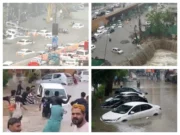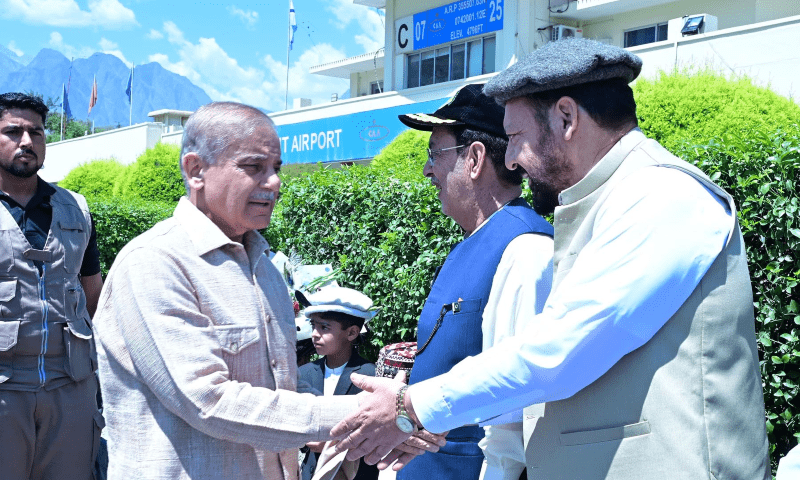Gilgit-Baltistan, August 4:
Prime Minister Shehbaz Sharif arrived in Gilgit-Baltistan (GB) on Monday for a one-day visit to assess the widespread damage caused by relentless monsoon rains, flash floods, and cloudbursts that have devastated the mountainous region since late June.
Upon his arrival at Gilgit Airport, he was received by Governor Syed Mehdi Shah, Chief Minister Gulbar Khan, and senior officials. The governor briefed the premier on the large-scale destruction caused by extreme weather, including landslides, the washing away of roads, and flooding in multiple valleys.
Emergency Declared in 37 Areas
The GB government declared a state of emergency in 37 areas across eight districts — Diamer, Gilgit, Ghizer, Skardu, Shigar, Ghanche, Nagar, and Kharmang — following deadly flash floods that have so far claimed at least 10 lives, most of them tourists. Four people have been injured, and at least a dozen remain missing, with rescue operations still underway.
According to a notification issued by the GB Home Department, entire villages have been submerged, homes destroyed, and infrastructure swept away as torrential floodwaters surged through the region. At least 509 houses and 22 vehicles were reported destroyed, with losses extending to livestock, crops, and basic infrastructure.
PM’s Briefing and Federal Response
Chairing a high-level review meeting, PM Shehbaz received a ground-level briefing on the extent of the damage and status of relief efforts and ongoing development projects. He expressed deep sorrow over the human and material losses and offered prayers for those who lost their lives.
Declaring that “Pakistan contributes minimally to global emissions yet suffers some of the worst impacts of climate change,” the prime minister emphasized the urgent need for effective, long-term climate resilience measures. He stressed that the Ministry of Climate Change had been directed to take immediate action, while the National Disaster Management Authority (NDMA) and other federal agencies were working closely with the GB administration.
He described the NDMA as a “key national institution” in disaster response and recovery and lauded the efforts of the ministries of communication, climate change, water resources, and GB affairs in handling the crisis.
The PM also reaffirmed the federal government’s commitment to GB’s development, confirming the launch of a Danish school project in the region soon to uplift education standards.
National Toll & Fresh Monsoon Alert
While GB is at the epicenter of the current emergency, the broader national picture remains grim. According to the NDMA, since June 26, 299 people, including 140 children, have died in floods and torrential rains across Pakistan. Over 715 individuals have been injured and more than 1,600 houses damaged or destroyed. The loss of 428 livestock has added to the misery in rural communities.
The NDMA has carried out 223 rescue operations, evacuated nearly 2,900 people, and dispatched thousands of relief items, including tents, hygiene kits, food packs, and de-watering pumps, while 71 emergency camps have treated hundreds in flood-hit regions.
Fresh Weather Threats Ahead
The Pakistan Meteorological Department (PMD) has issued a glacial lake outburst flood (GLOF) and landslide alert for GB and Khyber Pakhtunkhwa, warning of an intensified monsoon wave from August 4 onwards.
Scattered rains, isolated heavy falls, and thunderstorms are expected, posing further risk to already-vulnerable areas.







































